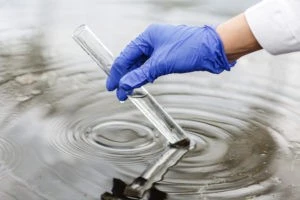 Seven symptoms of Camp Lejeune water contamination include mental confusion, depression, inability to focus, sleepiness, slowed reaction time, headaches, and behavior disorders. Camp Lejeune water contamination is also linked to illnesses such as cancer and Parkinson’s Disease.
For more than 30 years, between 1953 and 1987, the water supply for Marine Corps Base Camp Lejeune was contaminated with several toxic substances, including trichloroethylene (TCE), tetrachloroethylene (PCE), and vinyl chloride. These chemicals are known carcinogens and have caused a range of negative health outcomes. Victims of Camp Lejeune water contamination often qualify for unique U.S. Department of Veterans’ Affairs (VA) benefits or legal action.
Seven symptoms of Camp Lejeune water contamination include mental confusion, depression, inability to focus, sleepiness, slowed reaction time, headaches, and behavior disorders. Camp Lejeune water contamination is also linked to illnesses such as cancer and Parkinson’s Disease.
For more than 30 years, between 1953 and 1987, the water supply for Marine Corps Base Camp Lejeune was contaminated with several toxic substances, including trichloroethylene (TCE), tetrachloroethylene (PCE), and vinyl chloride. These chemicals are known carcinogens and have caused a range of negative health outcomes. Victims of Camp Lejeune water contamination often qualify for unique U.S. Department of Veterans’ Affairs (VA) benefits or legal action.
In This Article
Reading time: 4 minutes
- Recognizing Symptoms of Camp Lejeune Water Contamination Exposure
- Symptoms of Camp Lejeune Water Contamination
- Medical Conditions Linked to Camp Lejeune Water Contamination
- Reach Out to Us to Work With Our Camp Lejeune Water Contamination Lawyer
Recognizing Symptoms of Camp Lejeune Water Contamination Exposure
Symptoms of Camp Lejeune water contamination can vary depending on factors such as the duration and level of exposure, as well as individual susceptibility. Common symptoms may include gastrointestinal issues such as nausea, vomiting, and abdominal pain, as well as neurological symptoms like headaches, dizziness, and cognitive difficulties. Additionally, exposure to contaminated water may lead to skin problems such as rashes, itching, and irritation. Moreover, long-term exposure to contaminants like volatile organic compounds (VOCs) and heavy metals may increase the risk of developing serious health conditions such as cancer, reproductive disorders, and neurological diseases. Individuals who have resided or worked at Camp Lejeune during the period of water contamination and experience any of these symptoms should seek medical evaluation promptly and consider consulting with healthcare providers familiar with the potential health effects of Camp Lejeune water contamination.For a free legal consultation, call (516) 932-0400
Symptoms of Camp Lejeune Water Contamination
If you lived or worked at Camp Lejeune between 1953 and 1987, you were likely exposed to dangerous chemicals through the base’s water supply. Exposure to Camp Lejeune contaminated water has already caused a range of conditions in victims. If you’re concerned about the health symptoms you’re experiencing, you should seek medical attention first. A doctor should provide you with a diagnosis and treatment plan. According to a study described in the Review of VA Clinical Guidance for the Health Conditions Identified by the Camp Lejeune Legislation, seven of the symptoms associated with Camp Lejeune’s contaminated water include:- Mental confusion
- Depression
- Inability to focus
- Sleepiness
- Slowed reaction time
- Headaches
- Behavior disorders
Medical Conditions Linked to Camp Lejeune Water Contamination
According to VA, some of the health conditions linked to Camp Lejeune water contamination include:Cancer
Several types of cancers are considered “presumptive conditions” in association with Camp Lejeune. Suffering from a presumptive condition could make it easier to secure VA benefits or file a lawsuit, provided you meet other eligibility requirements. These are the types of cancers VA presumes to be linked to Camp Lejeune water contamination:- Adult leukemia
- Liver cancer
- Bladder cancer
- Multiple myeloma
- Kidney cancer
- Non-Hodgkin’s lymphoma
Parkinson’s Disease
Parkinson’s disease is another Camp Lejeune presumptive condition. This condition involves a slow degradation of the central nervous system. According to Mayo Clinic, symptoms include:- Slow bodily movement
- Difficulty speaking or writing
- Rigid muscles
- Tremors
- Impaired balance
Birth Defects
Preliminary research from the Agency for Toxic Substances and Disease Registry (ATSDR) suggests that some fetuses exposed to toxic chemicals at Camp Lejeune prior to birth have suffered from the following defects:- Neural tube defects: Spina Bifida and Anencephaly are two types of neural tube defects. Spina Bifida causes the spinal cord to grow improperly, leading to outward growth on an infant’s spine. Anencephaly, on the other hand, causes an infant’s skull to form incorrectly.
- Oral cleft defect: Oral cleft defects occur when an infant’s lip muscle forms improperly, leaving a gap. This condition is typically treatable through surgery, although it leaves permanent scarring on an infant’s facial muscles below the nose.
- Childhood leukemia: Childhood leukemia is a form of early-onset blood cancer. While this condition is often severe, it is treatable with chemotherapy and surgery.
Female Infertility
VA believes that exposure to Camp Lejeune contaminated water has caused female infertility in some cases, which prevents a female from becoming pregnant. In addition, reports indicate that those stationed at Camp Lejeune appear to suffer miscarriages at higher rates than the general population. Symptoms of a miscarriage include:- Severe cramping
- Vaginal bleeding
- Abdominal pain
Scleroderma
Scleroderma is an autoimmune disorder that’s broken into two types:- Localized scleroderma: Localized scleroderma primarily affects the skin.
- Systemic scleroderma: This form of scleroderma is more severe. It impacts ligaments, joints, and major internal organs.
Myelodysplastic Syndromes
Myelodysplastic syndromes are a complex family of conditions linked to faulty white blood cell production. Generally, these conditions lead to a build-up of unhealthy white blood cells, causing infections, fatigue, and bleeding. These are some common symptoms in those suffering from myelodysplastic syndromes:- Fatigue
- Frequent infections
- Shortness of breath
- Easy bruising
- Small red dots appearing beneath the skin, known as petechiae
Click to contact our personal injury lawyers today
Reach Out to Us to Work With Our Camp Lejeune Water Contamination Lawyer
At Friedman & Simon, L.L.P., our New York Camp Lejeune Lawyer is here to review your case for free and determine if you’re eligible for compensation. We will explain the ins and outs of accessing Camp Lejeune compensation, from the importance of presumptive conditions to filing a lawsuit. Contact us to get started today.Call or text (516) 932-0400 or complete a Free Case Evaluation form
